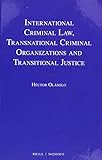International Criminal Law, Transnational Criminal Organizations and Transitional Justice / by Hector Olasolo
Material type: TextPublication details: Boston: Brill, 2018Description: xvii, 233p.; 24cmISBN:
TextPublication details: Boston: Brill, 2018Description: xvii, 233p.; 24cmISBN: - 9789004340992
- 345 OLA
| Item type | Current library | Call number | Status | Date due | Barcode | |
|---|---|---|---|---|---|---|
 Books
Books
|
Central Library | 345 OLA (Browse shelf(Opens below)) | Available | 000575 |
Includes bibliographical references and index.
Part 1. Foundations of international criminal law
Chapter 1. Definition, protected values and goals of international criminal law
Chapter 2. Historical evolution of international criminal law3 normative hierarchy of the norms prohibiting international crimes
Chapter 3 Normative hierarchy of the norms prohibiting international crimes
Part 2. The scope of criminal proceedings for International crimes since the end of the Cold War
Chapter 4. The scope of criminal proceedings in international and hybrid criminal tribunals
Chapter 5. The scope of criminal proceedings for international crimes in national jurisdictions
Part 3. International criminal law and transnational criminal organizations
Chapter 6. How do transnational criminal organizations operate?
Chapter 7. Is international criminal law an appropriate mechanism to deal with transnational criminal organizations?
Part 4. International criminal law and transitional justice
Chapter 8. Definition and scope of transitional justice : should it be applied to situations of large scale violence by transnational criminal organizations? special attention to the situation in Mexico
Chapter 9. The tension between criminal proceedings for international crimes and truth commissions as central elements of a liberal approach to transitional justice
Chapter 10. From a social- democratic approach to transitional justice to the contributions of critical theories
Chapter 11. From the 1984 Naval Club Agreement in Uruguay to the 2016 Colon Theatre Peace Agreement in Colombia
Chapter 12. How should the normative dilemma posed by the overlapping scopes of application of international criminal law and transitional justice be addressed?
Table of Case
Bibliography
Index
Parties negotiating the end of authoritarian regimes or armed conflicts are almost inevitably left in a situation of legal uncertainty. Despite their overlapping scope of application, the differences between the approaches of International Criminal Law (ICL) and Transitional Justice (TJ) are so profound that, unless dogmatisms are left aside and a process of dialogue is entered into, it will not be possible to harmonize the current legal regime of international crimes with the need to articulate transitional processes that are capable of effectively overcoming authoritarian regimes and armed conflicts. The serious material limitations shown by national, international and hybrid ICL enforcement mechanisms should be acknowledged and the goals pursued by ICL should be redefined accordingly. A minimum level of consensus on the scope of application, goals and elements of TJ should also be reached. Situations of systematic or large scale violence against the civilian population by transnational criminal organizations increase the challenge. (Source: WolrdCat)
There are no comments on this title.

